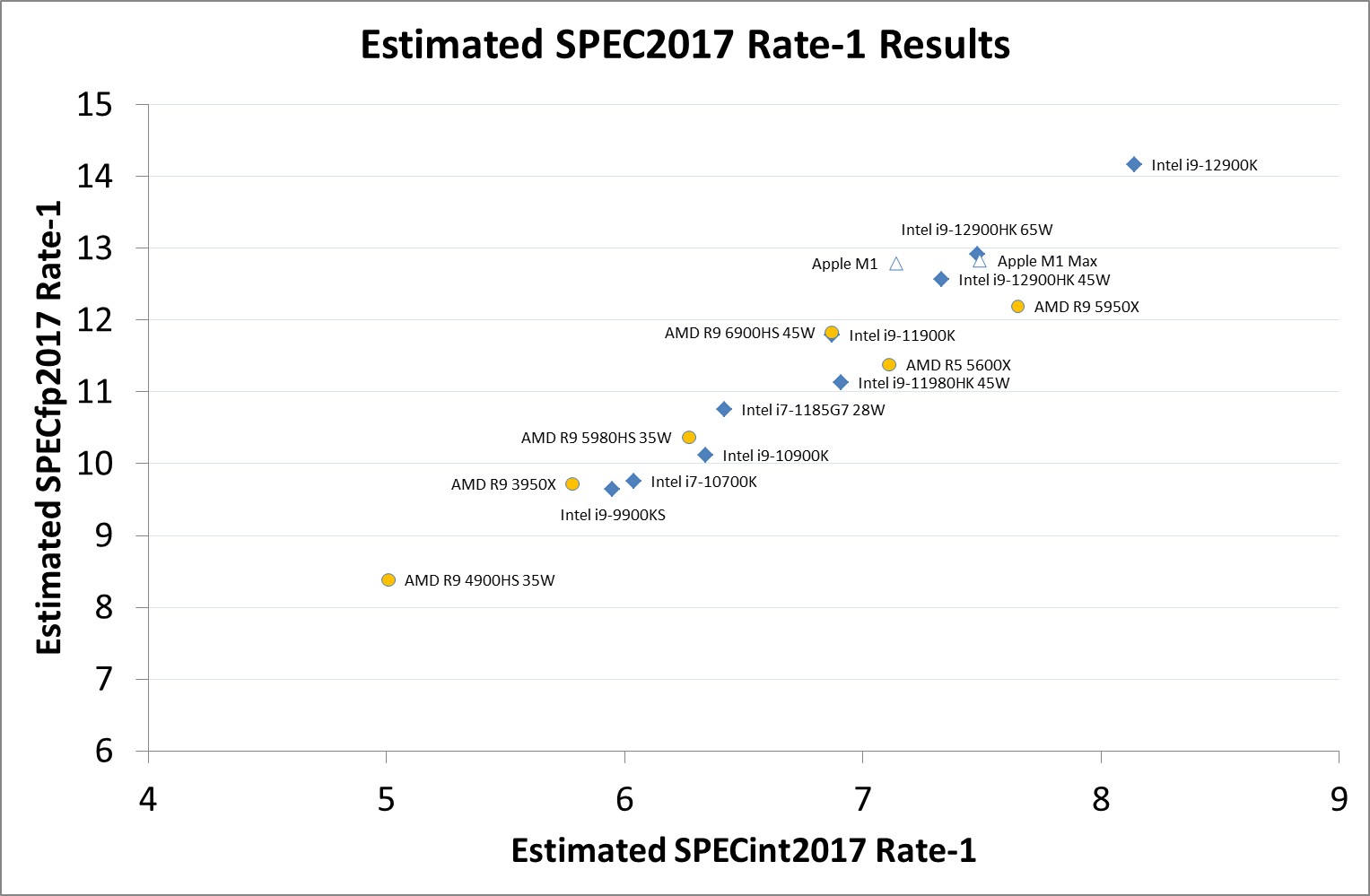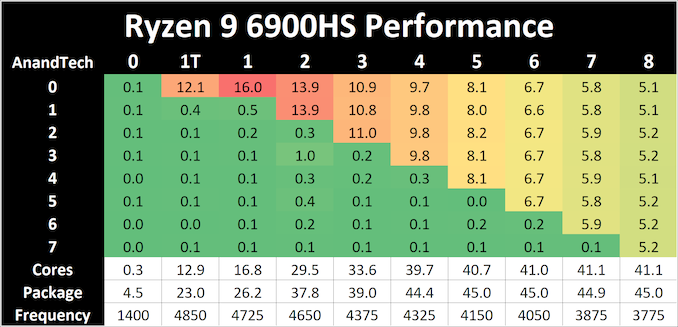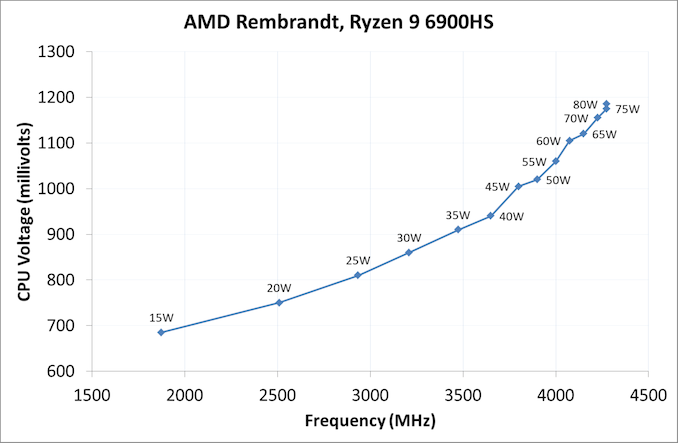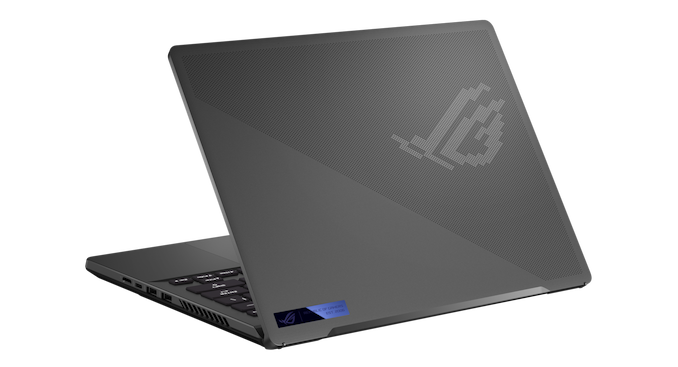AMD's Ryzen 9 6900HS Rembrandt Benchmarked: Zen3+ Power and Performance Scaling
by Dr. Ian Cutress on March 1, 2022 9:30 AM ESTConclusion
When AMD announced the new Ryzen 6000 Mobile series, codename Rembrandt, we saw a number of distinct upgrades over the previous generation: moving from TSMC 7nm to TSMC 6nm should provide a small efficiency boost, and then coupled with the move from DDR4 to DDR5 should greatly improve any memory-bound workloads. Instead of Vega graphics we now move to RDNA2 graphics, which should provide a much better gaming experience, coupled with that increased memory bandwidth. On top of that all, we were told about AMD’s 50+ updates to the SoC focused on power management, wake from sleep, and race to sleep. The one thing that we knew didn’t change was the CPU core: despite being called Zen3+, there is no difference in the microarchitecture compared to Zen3 – the reason why it gets a plus is due to the power management techniques, improved memory, and new manufacturing process.
But the fact of the matter is, CPU performance is more than just the microarchitecture and frequency. Beyond that, it’s the memory subsystem, which also contributes directly to IPC or performance per clock. This is why I’ve gone off iso-frequency testing for this sort of comparison, because each product is built with optimization points in mind, and moving simply the core frequency causes a different balance of resources compared to the ‘as built’ and ‘as sold’ metrics. This is why when we put Zen3+ up against Zen3 at a similar power level, we’re seeing a sizable uptick in performance.
In our industry standard SPEC tests, this translates to an +11.9% average increase for Zen3+ across integer and floating point in single threaded mode compared to Zen3. In multi-threaded mode at 35 W, this was a +10.4% for integer, but +32.4% for floating point. We saw a similar size jump in our multi-threaded floating point SPEC tests when Intel’s Alder Lake moved from DDR4 to DDR5, showcasing that there are key industry standard workloads for which DRAM memory bandwidth is still the limiting factor.
So while it’s a great move to see AMD jump into DDR5 with this new platform, the elephant in the room is still the performance against similar power hardware from Intel. Unfortunately we don’t have too many data points, as Brett in Canada tested the performance-focused 12900HK, and I’m the UK where I tested the efficiency-focused 6900HS, but suffice to say that in raw performance at least, comparing P cores to Zen3+ and multi-threaded workloads, Intel still has an advantage. Intel’s advantage increases when we increase the power, as it seemingly has more frequency to give, whereas AMD’s Rembrandt is already near peak all-core frequency at modest 35-45W power levels. This is showcasing one difference between the two manufacturing processes: AMD on TSMC N6, and Intel on Intel 7.
If we take something as simple as CineBench R20 (everyone’s favorite), the Intel CPU in 45 W mode scores 730, while the AMD CPU in 45 W mode scores 613, only matching Intel’s previous generation. That’s partly due to the single threaded power consumption on both platforms – while AMD is using 12.9 W on the cores (23 W package) to reach one thread at 4850 MHz, and doesn’t improve single thread performance in higher power modes, Intel does gets a performance uplift going from 45 W to 65 W, suggesting that the single thread power consumption is up in that region.
The same applies for multi-threading – in a lot of our benchmarks we see that AMD scores minor gains going from 35 W to 45 W to 65 W, indicating that the efficiency point is really around that 35 W metric. But when we scale that up to the multi-threaded tests, Intel can scale power for additional performance a lot more, but also wins as it has a total of 20 threads, compared to AMD’s sixteen. This means at the end of the day Intel can get +40% performance at the same power in benchmarks that can take advantage of its core structure, but only +14% in other tests (like SPEC) despite having +25% more cores.
While we haven’t touched battery life or graphics in this article, instead looking at CPU performance, we can see that realistically AMD is finding a good optimization point around that 35 W mark with this new Rembrandt chip. Pushing for more power gives minor performance uplifts, suggesting it isn’t really that scalable, but when we combine the new updated SoC with the move to DDR5, it’s still a great performer. In fact, both Intel and AMD chips seem to be amazing this generation, and if you’re in the market for a flagship, CPU performance is everywhere. But right now, Intel seems ahead at the high-end.
What’s going to be interesting here is testing the 15 W versions of the latest platforms. AMD still has 8 core processors, with all 8 cores being big cores, whereas Intel has moved down to 2 big cores paired with 8 efficient cores. We might see the tides shift the other direction allowing AMD to be more scalable, pushing 15 W or higher modes with more performance, while Intel relies on the efficient cores to pick up the rest of the workload. Ultimately this is where the battle really matters, as this is at the price points where most notebooks are going to be sold.
















92 Comments
View All Comments
mode_13h - Friday, March 18, 2022 - link
> I haven't seen most of the anime you mentionedThe Patlabor OAVs and movies are good for an 80's/90's nostalgia hit, IMO. It's that sort of old timey mecha anime that attracted many of us to the anime multiverse, in the first place. When I watched the OAVs on blu ray, the restoration was fantastic. Very crisp HD.
> the new Dune was a big disappointment to me.
Yeah, I read the trilogy before watching it. I'm so glad I did, because I knew exactly what was going on. Otherwise, I might've been lost.
Yeah, they tried too hard to follow the narrative of the book. I think the only way to do it, and still end up with a good movie, is to focus on a particular story arc. If they'd nailed it, that would've set the stage for more to follow.
I'd imagine they shot so much footage that it could conceivably be re-edited. I know they didn't shoot beyond the movie's ending, because I saw an interview with Zendaya, where she said she was only on location for the desert scenes for a couple days.
mode_13h - Friday, March 18, 2022 - link
I mean the original Patlabor OAVs. There are about 7 of them, I think. Near movie-quality animation, for the time.BTW, some aspects of the Ghost in the Shell franchise definitely make more sense, as we move towards the future it predicted.
Oh, and Planetes is a nice series about a crew working to collect orbital debris. It aired about 2 decades ago, but I think it was based on manga that was older, still. Some aspects of it were a bit anachronistic even for the time, but other aspects about space physics and orbital living clearly received a lot of thought and attention. The story arc is a lot more interesting than it sounds, with lots of commentary about life, love, the privatization of space, corporate politics, geopolitics, personal ambition, and the ultimate path and personal costs of space exploration. If you don't mind a bit of slapstick and are willing to look past some of the more anachronistic aspects, it's worth a watch.
GeoffreyA - Saturday, March 19, 2022 - link
I haven't read the books but hope to do so before going into the coffin. Well, my view is that the excessive realism somehow harms the movie. If you go back to Lynch's 1984 version, despite the outlandish visuals, it is pretty alien, as Dune should be; and from a storytelling point of view, does that pretty well, going forward rapidly. Also, the princess's summary in the beginning got the viewer up to speed with this strange universe.The new movie took "show, don't tell" a bit too far, and the story didn't feel cohesive or unified, especially towards the end. It was tedious. The visions seemed forced and overdone. And for an epic, the cinematography was poor in my opinion. A key problem, I feel, is that it didn't bring out the true spirit of the desert. Coupled to this issue is Zimmer's music, in my view, missing the mark. It was too loud and vulgar, and seemed to view the desert from a commercialised, Hollywood lens, rather than feeling its power and reflecting that desolation. Then the CGI, I say no more.
On the plus side, two sequences were outstanding: when Paul first steps onto the desert and picks up the sand/spice; and Paul and his mother's flight through the dust storm. That was world class.
GeoffreyA - Saturday, March 19, 2022 - link
When I saw the Patlabor poster some time ago, I was intrigued. That was part two I believe. Yes, as time goes by, I prefer to look back at older anime. I think it's fair to say the industry has gone downhill these days.And thanks for that great description of Planetes. I won't mind giving one or two episodes a go and seeing what it's like. It reminds me that I've still got to watch Cowboy Bepop.
mode_13h - Sunday, March 20, 2022 - link
Planetes is one of those series that takes a while to get going. The further you go, the deeper it gets. If you really don't like the first couple episodes, maybe it's not for you. However, you do get rewarded the longer you stick with it.mode_13h - Monday, March 21, 2022 - link
> I haven't read the books but hope to do so before going into the coffin.There's a lot you can read into it about the corrupting tendencies of empires and exploitation of peoples and their natural resources. It feels like it might've tapped into the decolonization zeitgeist, or at least what I presume it should've been, as the former colonial powers of Europe unwound their foreign holdings. I could do without so much of the psychedelic stuff, but I know Heinlein also went there. So, maybe that was just another trend in 1960's sci fi.
> If you go back to Lynch's 1984 version
It's funny this came up, because I just started watching it last weekend and finished it mere hours ago. It did seem a bit overwrought. I remember how he seemed rather too fascinated with the perversions and excesses of the Harkkonen. I thought the exposition was a bit too much for the naive movie-goer, but probably a helpful reminder for those who'd read the books years earlier.
Since I came to it with low expectations, I really wasn't disappointed. Since the movie had many shots in low light, I wonder just how much I benefited from seeing a clean, HD presentation. Overall, I guess my main complaints would be that some of the acting seemed sub-par (Sting, for one, definitely should've stayed focused on the music business) and I just wouldn't have tried to cover so much plot. It felt busy and probably hard for people to follow, without having read it. I wasn't too bothered by the dated special effects, but they do kind of jump out at you. Some of the sets were quite impressive.
> The new movie took "show, don't tell" a bit too far
Probably a reaction to Lynch's version. I also wonder if his 1990 TV series, Twin Peaks, was also sort of a reaction to the criticism he got for too much exposition in Dune.
Anyway, the last I'll say about it is that I'm finding the Wikipedia page on Dune to be a good resource on the author and his influences.
GeoffreyA - Monday, March 21, 2022 - link
The visuals prevented me from watching it for a long time. It was only after I became a fan of David Lynch that I was able to see past that and appreciate what he had done. I think for a two-hour adaptation of such a vast novel, it is a commendable attempt, and I prefer it. As for the excesses, etc., well, that's Lynch as always. He always tends to bring out the darker side of things.I actually love Twin Peaks, and the recent season 3 was spectacular, if strange. But strange is this man's domain. Did too much exposition have an effect on his later work? I would say that Dune was an exception. Generally, his films are pretty obscure, nothing much being spelled out, and one often has to piece together a puzzle. He started off with that note in Eraserhead and hasn't really changed in four decades.
GeoffreyA - Monday, March 21, 2022 - link
"Sting, for one, definitely should've stayed focused on the music business"The best line!
mode_13h - Tuesday, March 22, 2022 - link
> I actually love Twin PeaksI never really watched it. My older sister watched the original TV airing. All I remember of it was the general strangeness and a recollection that even its conclusion left much unanswered.
I haven't seen much of Lynch's work, but I did enjoy Mulholland Dr. All I remember from it is that I decided it's a fool's errand to make complete sense of the plot, since there were paradoxes inserted seemingly with the intent to break any strict interpretation.
> Did too much exposition have an effect on his later work?
That's not really what I meant. I was suggesting he got too much negative feedback on all the exposition in Dune, and therefore went too far in the other direction of being too obscure.
From what I've heard, Kubrick would sometimes indulge in excessive obscurity to create a false sense of depth. The prime example being 2001: A Space Odyssey. If you actually read the book, you can supposedly see what kind of shenanigans he got up to, which I've heard he even admitted in an interview.
> He started off with that note in Eraserhead and hasn't really changed in four decades.
Ah, right. I never got round to watching that one.
GeoffreyA - Wednesday, March 23, 2022 - link
Mulholland Drive is perhaps my favourite film of all films. Again, it's the tragic note that speaks to me, and Naomi Watts, brilliant. I've racked my head over this story a great deal, and my tentative answer is that even the latter part, Diane's tale, is a dream, various pieces of evidence pointing there, particularly the blue box and the smoke. The question is, whose dream is *that*! Perhaps it's the director's dream after all.I haven't read 2001, but you're right, the film keeps things pretty bare and mysterious, and that creates the feeling of a deep, even terrible, mystery. Our age could actually learn something from that and stop filling in all the details. The human mind does a far better job at piecing together the monster in the shadows.